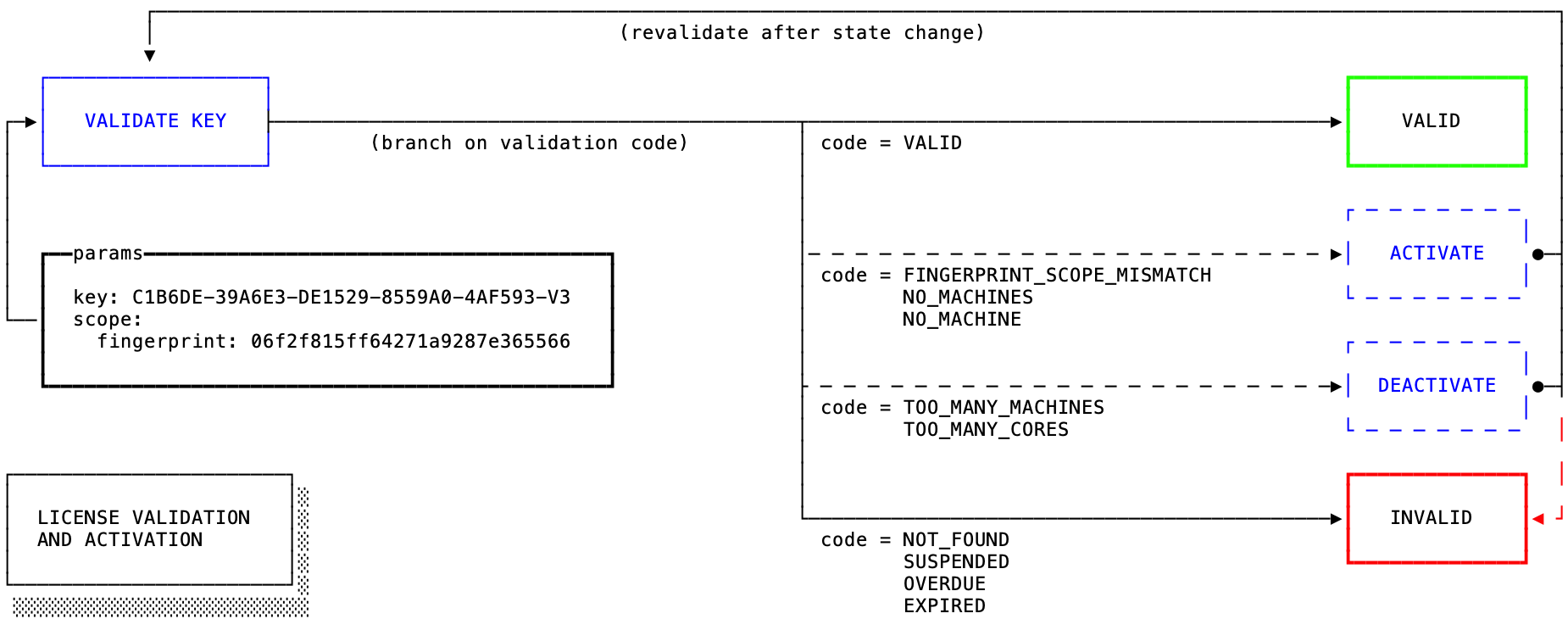Node-locked Licenses
What is a node-locked license?
Similar to a floating license, a node-locked license is a license that is only allowed to be used on a single device (referred to as a machine). A node-locked license may also be referred to as an "anchored" license. In a node-locked licensing environment, a license is activated on a first come, first served basis. The activated machine may be deactivated to free up the slot for a different machine, but deactivations can be disabled if required.
How do I implement a node-locked license?
To configure a node-locked license model, you will want to create a new Policy resource (or modify an existing Policy), and set a maximum machine limit of 1. You may also wish to set the node-locked Policy to strict, which is further explained below.
Then, within your software, you will want to integrate the following request flow:

- Validate the license key along with a fingerprint validation scope
- Activate the current machine for the license if not activated
- Revalidate the license key after activation (optional)
When you validate the license in step 1, the response data will contain the full license object, including the license's ID, which can be used for any subsequent activation requests. Step 2 will only need to be performed when the following validation code is received:
NO_MACHINE: The license has no machine activations
In the case where the node-locked license is already activated on another machine, the
validation code will equal FINGERPRINT_SCOPE_MISMATCH. You can either deny use of the
license on the unactivated machine, or you can prompt the licensee to deactivate the machine
that the license is currently locked to and activate their new machine.
To ensure that every license validation request is scoped to a machine fingerprint, you can configure your Policy to require a fingerprint scope.
Strict vs non-strict
Setting the Policy to strict will require that each node-locked license has exactly 1 machine activation to be considered valid. A non-strict license will not take machine activations into account when validating a license, unless a specific scope is provided during the license validation request. We recommend setting your Policy to strict to ensure that all usage is accounted for.
Licensing by process count
You can configure a Policy to enforce a maximum Process count. This is especially useful when you want to control application or instance concurrency for each machine. For example, you could configure your policy to allow 1 machine with up to 10 processes, or allow 3 machines with a total process count of 3 across all machines (i.e. one each).
Offline capability
By utilizing cryptographically signed license keys and license files, you can implement an offline-capable floating license model. Cryptographic license keys and files can be distributed to air-gapped environments in a variety of ways: email, license file, USB key, on-premise license server, or through the use of QR codes.
| Perpetual License | Timed License | Floating License | Node‑locked License | Feature License | |
|---|---|---|---|---|---|
| Expiration Date | No | Yes | Optional | Optional | Optional |
| Activation Limits | Optional | Optional | > 0 | 1 | Optional |
| Feature Limits | Optional | Optional | Optional | Optional | Yes |
| Offline Support | Yes | Yes | Yes | Yes | Yes |
| Learn More | Learn More | Learn More | Learn More |